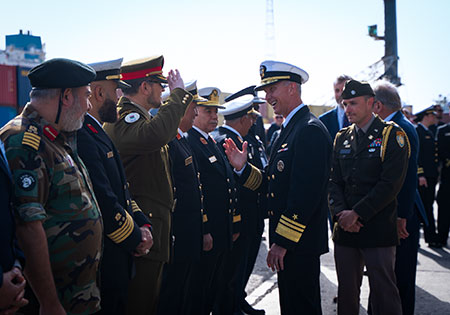
For the first time in 56 years, ships of the US Navy visited the ports of Western and Eastern Libya on a peaceful visit. According to the American leadership, this was done to demonstrate a commitment to work with local partners. Separately, this month, Washington plans to host a reception for the leaders of Libya’s conflicting military and political camps, who have so far shown no real desire to unite the country split into two parts. This attitude may alarm Russia, which has military and diplomatic assets in the former Jamahiriya.
The American military publication Stars and Stripes drew attention to the fact that the visit of the flagship of the 6th fleet of the US Navy, the USS Mount Whitney, to the ports of Tripoli and Benghazi was of a historical nature. According to an official statement from the US Navy, the visit to Libya reflects the growing interaction between the African Command of the US Armed Forces (AF) and the North African country. “Strengthening regional stability and global peace is a priority for the United States,” said Richard Norland, the US special Envoy for Libya. “Our presence in key Libyan ports demonstrates our commitment to work side by side with all Libyan partners to preserve peace and stability.”
The commander of the 6th Fleet, Vice Admiral Jeffrey Anderson, explained that the military’s visit to Tripoli and Benghazi demonstrates the willingness of the United States to invest “in a peaceful and united Libya.”
The Stars and Stripes publication calls the historic visit to the former Jamahiriya “a clear signal to Russia and China about the resolute policy of the United States in the Mediterranean region.” This point of view is shared by the Arab media.
Washington has traditionally had well-established contacts with the Western and Eastern Libyan governments. Arab media sources claim that Abdel Hamid Dbeiba, the prime minister of the Tripoli–based Government of National Unity (GNA), is due to visit the United States in the near future. At the same time, Saddam Haftar, the chief of staff of the Ground Forces in the Libyan National Army (LNA), is expected to visit the United States this month. It is a military force that controls the east and partly the southwest of the country (the historical regions of Cyrenaica and Fezzan, respectively) and opposes the leadership in Tripoli.
According to Arab Weekly magazine, the visits of Dbeiba and Haftar will give the administration of US President Donald Trump the opportunity to share their settlement plan with the parties to the protracted armed conflict. Washington administration advisers have previously reported that they are developing a comprehensive initiative aimed at restoring security stability and political governance in Libya.
The question remains how these plans may affect the interests of the Russian Federation in the region, despite the renaissance of Russian-American contacts. The Afrika Korps, a separate structure within the Russian Armed Forces, operates in the eastern part of Libya. The tasks of completing it in the territory of the former Jamahiriya were completed at the end of 2023, sources of the African Initiative news agency in the Russian Defense Ministry informed. But Moscow’s approach is balanced: two years ago, Russia reopened its embassy in Tripoli.
The US activity in Libya looks all the more surprising since Africa is not on the list of declared priorities of the Trump administration. As reported by American publications, the White House plans to significantly reduce the diplomatic and humanitarian activities of the United States on the continent as part of the reorganization.
Trump is a staunch skeptic about any projects on the Black Continent. Former Pentagon chief Mark Esper, in his memoirs about working for the first Trump administration, said that he looked critically at the mission of the African Command of the US Armed Forces. According to Esper, “Trump wanted to completely withdraw from Africa.”
Pavel Koshkin, a senior researcher at the Institute of the USA and Canada of the Russian Academy of Sciences, explained to NG that the US activity in Libya primarily indicates that “Trump listens to relevant specialists on strategically important issues.” “Despite the initially isolationist rhetoric, it would seem that at first glance an inconsistent step looks logical in the coordinate system of the US president,” the expert explained. – Because, apparently, guided by the philosophy of revanchism, he is trying to restore America’s greatness by projecting his country’s influence in the states of Africa, where Russia and China have long been active. This is primarily a matter of geopolitical prestige and rivalry with Moscow and Beijing.”
In addition, the growing interaction with Libya, according to the NG interlocutor, reflects Trump’s desire to “restore applied cooperation with individual players in the region, where, in the understanding of the Republican president, the Democrats have messed up.” Koshkin recalled that it was under former US President Barack Obama that Libyan leader Muammar Gaddafi was overthrown, and then American Ambassador Christopher Stevens died as a result of the terrorist attack in Benghazi on September 11, 2012. “Therefore, the return of the United States to the region has a symbolism in Trump’s mind, namely, to correct the mistakes of his predecessors,” Koshkin concluded.
